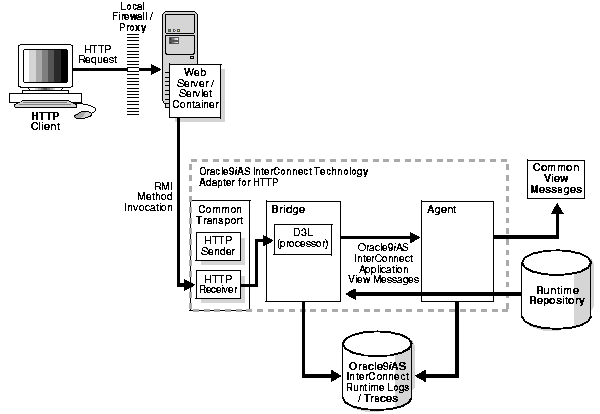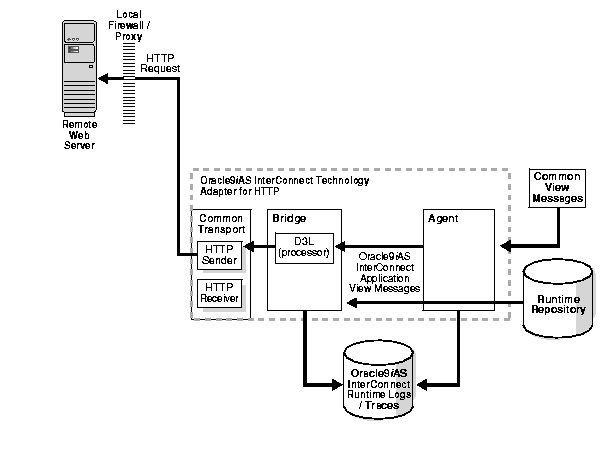Release 2 (9.0.2)
Part Number A95445-01
Home |
Contents |
Index |
| Oracle9iAS InterConnect Adapter for HTTP Installation and User's Guide Release 2 (9.0.2) Part Number A95445-01 |
|
This chapter describes the Hypertext Transfer Protocol (HTTP) adapter and the hardware and software requirements.
This chapter contains these topics:
The HTTP adapter enables an HTTP application to be integrated with other applications using Oracle9iAS InterConnect. This adapter is useful in all enterprise application integration (EAI) environments that use the HTTP transport protocol. EAI is the integration of applications and business processes within the same company (known as an enterprise).
The HTTP adapter performs the following tasks:
The payload type (the data being delivered to a destination) for the HTTP adapter is one of the following:
The HTTP adapter supports HTTP versions 1.0 and 1.1. The HTTP adapter also provides SSL functionality (known as HTTPS) with Oracle JavaSSL, which uses a wallet generated from Oracle Wallet Manager. You can also select cipher suites suitable for an SSL connection. Cipher suites control the combination of encryption and data integrity used by SSL. The HTTP adapter also supports sending HTTP requests and receiving HTTP replies through a proxy server.
Figure 1-1 depicts the data flow of incoming messages (from an HTTP client to Oracle9iAS InterConnect). Incoming messages are sent to a Web server/servlet container that relays the message to an HTTP receiver in the adapter through a remote method invocation (RMI).

Figure 1-2 depicts the data flow of outgoing messages (from Oracle9iAS InterConnect to a remote Web server). Outgoing messages are sent from an HTTP sender object in the adapter to a remote Web server.

The following sections describe HTTP adapter system requirements:
Table 1-1 lists the hardware requirements for the computer on which the Oracle HTTP adapter is to be installed.
| Hardware | Windows NT/2000 | UNIX |
|---|---|---|
|
Memory |
128 MB |
128 MB |
|
Service Pack |
Windows NT 4.0 Service Pack 6 or later Windows 2000 Service Pack 1 or later |
Not applicable |
|
Disk Space |
500 MB |
500 MB |
The following sections describe HTTP adapter software requirements:
Table 1-2 lists the software requirements for the computer on which the Oracle HTTP adapter is to be installed.
Oracle9iAS InterConnect uses Java Runtime Environment (JRE) 1.3, which is installed with its components.
The HTTP adapter requires Oracle9iAS Containers for J2EE (OC4J), which is provided by Oracle9iAS. OC4J is not required to be installed on the computer on which the Oracle HTTP adapter is installed.
The HTTP adapter has the following limitations:
|
|
 Copyright © 2002 Oracle Corporation. All Rights Reserved. |
|